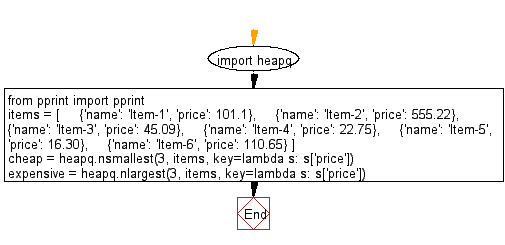Python: Get the n expensive and cheap price items from a given dataset using Heap queue algorithm
Python heap queue algorithm: Exercise-10 with Solution
Write a Python program to get the n expensive and cheap price items from a given dataset using Heap queue algorithm.
Sample Solution:
Python Code:
import heapq
from pprint import pprint
items = [
{'name': 'Item-1', 'price': 101.1},
{'name': 'Item-2', 'price': 555.22},
{'name': 'Item-3', 'price': 45.09},
{'name': 'Item-4', 'price': 22.75},
{'name': 'Item-5', 'price': 16.30},
{'name': 'Item-6', 'price': 110.65}
]
cheap = heapq.nsmallest(3, items, key=lambda s: s['price'])
expensive = heapq.nlargest(3, items, key=lambda s: s['price'])
print("Original datasets:")
pprint(items)
print("\nFirst 3 expensive items:")
pprint(expensive)
print("\nFirst 3 cheap items:")
pprint(cheap)
Sample Output:
Original datasets:
[{'name': 'Item-1', 'price': 101.1},
{'name': 'Item-2', 'price': 555.22},
{'name': 'Item-3', 'price': 45.09},
{'name': 'Item-4', 'price': 22.75},
{'name': 'Item-5', 'price': 16.3},
{'name': 'Item-6', 'price': 110.65}]
First 3 expensive items:
[{'name': 'Item-2', 'price': 555.22},
{'name': 'Item-6', 'price': 110.65},
{'name': 'Item-1', 'price': 101.1}]
First 3 cheap items:
[{'name': 'Item-5', 'price': 16.3},
{'name': 'Item-4', 'price': 22.75},
{'name': 'Item-3', 'price': 45.09}]
Flowchart:

Visualize Python code execution:
The following tool visualize what the computer is doing step-by-step as it executes the said program:
Python Code Editor:
Have another way to solve this solution? Contribute your code (and comments) through Disqus.
Previous: Write a Python program to find the top k integers that occur the most frequently from a given lists of sorted and distinct integers using Heap queue algorithm.
Next: Write a Python program to merge multiple sorted inputs into a single sorted iterator (over the sorted values) using Heap queue algorithm.
What is the difficulty level of this exercise?
Test your Programming skills with w3resource's quiz.
Python: Tips of the Day
Find current directory and file's directory:
To get the full path to the directory a Python file is contained in, write this in that file:
import os dir_path = os.path.dirname(os.path.realpath(__file__))
(Note that the incantation above won't work if you've already used os.chdir() to change your current working directory, since the value of the __file__ constant is relative to the current working directory and is not changed by an os.chdir() call.)
To get the current working directory use
import os cwd = os.getcwd()
Documentation references for the modules, constants and functions used above:
- The os and os.path modules.
- The __file__ constant
- os.path.realpath(path) (returns "the canonical path of the specified filename, eliminating any symbolic links encountered in the path")
- os.path.dirname(path) (returns "the directory name of pathname path")
- os.getcwd() (returns "a string representing the current working directory")
- os.chdir(path) ("change the current working directory to path")
Ref: https://bit.ly/3fy0R6m
- New Content published on w3resource:
- HTML-CSS Practical: Exercises, Practice, Solution
- Java Regular Expression: Exercises, Practice, Solution
- Scala Programming Exercises, Practice, Solution
- Python Itertools exercises
- Python Numpy exercises
- Python GeoPy Package exercises
- Python Pandas exercises
- Python nltk exercises
- Python BeautifulSoup exercises
- Form Template
- Composer - PHP Package Manager
- PHPUnit - PHP Testing
- Laravel - PHP Framework
- Angular - JavaScript Framework
- Vue - JavaScript Framework
- Jest - JavaScript Testing Framework
